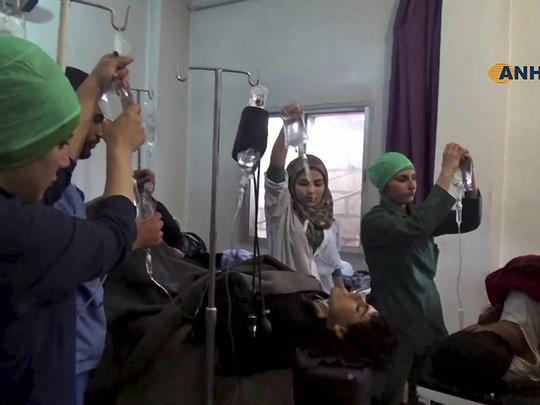
Beirut: A terrorist assault led by five suicide bombers killed dozens on Tuesday at a camp for the displaced near Syria’s border with Iraq, as pressure grows on Daesh (the self-proclaimed Islamic State of Iraq and the Levant) in both countries.
The violence left at least 38 people dead and came as another surprise Daesh attack on Tuesday claimed the lives of 10 soldiers in Iraq, to the south along the border.
The terrorist group appears to be lashing out as it faces escalating offensives on its last two major bastions: Mosul, Iraq’s second city, and Raqqa in neighbouring Syria.
Daesh’s dawn attack in Syria’s north-east hit a makeshift camp near the border with Iraq where some 300 families were waiting to cross into territory held by the Syrian Democratic Forces, a US-backed alliance that is leading the assault on Raqqa.
The Syrian Observatory for Human Rights, a monitoring group, said at least five suicide bombers blew themselves up inside and outside the camp in Hasakeh province which hosts Syrians and Iraqis forced from their homes.
Heavy clashes then erupted between Daesh fighters and the SDF near the camp, which lies just inside Syrian territory, Observatory head Rami Abdul Rahman said.
He said at least 38 people had been killed, including 23 displaced Syrians or Iraqi refugees.
“At least 30 people were wounded, and the death toll may rise because some people are in critical condition and others are still unaccounted for,” the Britain-based monitor said. Kamal Derbas, a press officer for the Kurdish Red Crescent, put the civilian death toll at 22.
He said the attack began at 4am local time (0100 GMT) and that 35 people were wounded.
Civilians fleeing Daesh in both Syria and Iraq have made their way to the desolate border region seeking protection and onward passage to safety in Kurdish-controlled territory.
But conditions in the area are harsh, with little shelter, overstretched authorities, and the risk of renewed violence.
The other Daesh attack in Iraq saw terrorists fire on an army base near the remote outpost of Rutba, near the country’s western borders with Syria and Jordan.
An Iraqi army lieutenant-colonel said that Daesh fighters fired mortar rounds and rockets at the 1st Division base in the Saggar area, east of Rutba, before trying to storm it.
Daesh appeared to be trying to breach the defence of Rutba, which is the last sizeable town on the road from Baghdad to the Jordanian border, as well as to create diversions to ease pressure on its fighters in Mosul, military officials said.
A massive offensive was launched in mid-October to retake Mosul, where Daesh head Abu Bakr Al Baghdadi declared the establishment of Daesh’s so-called “caliphate” nearly three years ago.
‘Violent’ Tabqa clashes
Daesh once controlled swathes of land on both sides of the Iraqi-Syrian border, but US-backed offensives have seen much of that territory retaken.
A US-led coalition began bombing Daesh positions in Iraq in August 2014 and launched raids against the jihadists in neighbouring Syria the following month.
In northern Syria, the coalition is backing the major assault by the SDF — an alliance of Arab and Kurdish fighters — on Raqqa.
A key waypost in that offensive is the city of Tabqa, which lies along the Euphrates River and on a Daesh supply route about 55 kilometres west of Raqqa.
On Tuesday, the SDF was locked in “very violent clashes” with Daesh in a northern district of Tabqa, the last section of the city still held by the terrrorists, the SDF said in a statement.
SDF fighters managed to seize a tank and several vehicles used by Daesh, it said.
More than 80 per cent of Tabqa is now in SDF hands, just eight days after the group first entered the city.
More than 320,000 people have been killed in Syria since the country’s conflict began in March 2011 with anti-government protests.












